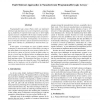194 search results - page 3 / 39 » Hypercube Network Fault Tolerance: A Probabilistic Approach |
DSN
2000
IEEE
14 years 10 days ago
2000
IEEE
This paper presents a generic methodology to transform a protocol resilient to process crashes into one resilient to arbitrary failures in the case where processes run the same te...
IPPS
1997
IEEE
14 years 4 days ago
1997
IEEE
Star networks were proposedrecently as an attractive alternative to the well-known hypercube models for interconnection networks. Extensive research has been performed that shows ...
DSN
2007
IEEE
14 years 2 months ago
2007
IEEE
Programmable logic arrays (PLA), which can implement arbitrary logic functions in a two-level logic form, are promising as platforms for nanoelectronic logic due to their highly r...
ISPAN
1999
IEEE
14 years 6 days ago
1999
IEEE
A network G is called random-fault-tolerant (RFT) network for a network G if G contains a fault-free isomorphic copy of G with high probability even if each processor fails indepe...
TPDS
1998
13 years 7 months ago
1998
—Unicast_V is a progressive, misrouting algorithm for packet or virtual cut-through networks. A progressive protocol forwards a message at an intermediate node if a nonfaulty pro...

